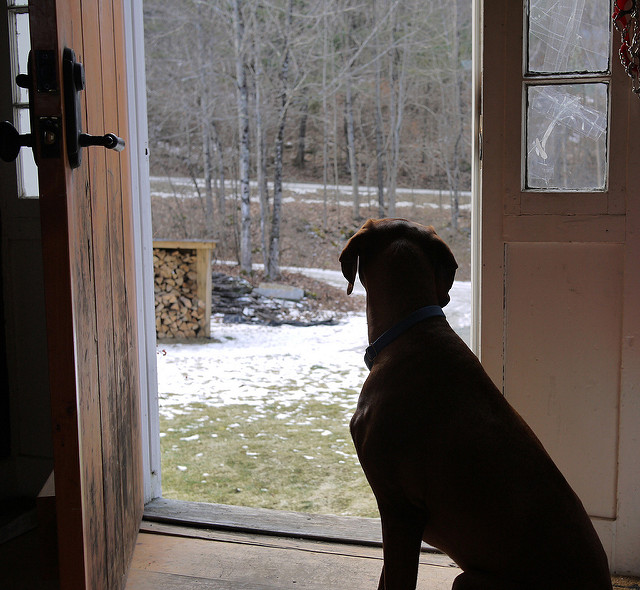Barks Blog
Front Door Freakout

If you come to my house, brace yourself.
You walk up the stairs, ring the doorbell. Suddenly…the shrieking of a hundred banshees? Maybe an exorcism in progress? Or fiery-eyed, froth-mawed Cerberus guarding the gates of Hades?
Nope. It’s my people-loving hound Huckleberry going freakshow crazy at the front door.
Sometimes trainers’ own dogs can make people doubt our training chops. Maybe it’s that we fall in love with “project” dogs, with issues so bedeviling we’re sure no one else will put up with them. We bring home these fixer-upper pups, and from day one it’s non-stop behavior modification. We lure, shape, capture, mark & reward, desensitize & countercondition obsessively until the day our project dog can just about pass as “normal.” And at that point, we might be forgiven for thinking we deserve a break.
I got lazy about dealing with Huckleberry’s door behavior. I let it escalate from a rumble of thunder into category 5 hurricane. And now I’m finally embarrassed enough to stop slacking off and start acting like a “real” dog trainer again.
But before I get to that, let’s have a think about doors.
There’s a lot of imagery and metaphors around doorways in our language. Doors represent hope and possibility: “Opportunity knocks.” “When one door shuts, another opens.” “Get your foot in the door.” To be “on the threshold” of something means means something big is about to happen. A “portal” in sci-fi parlance is a magical passageway between two realms, access to which may be intermittent and unpredictable.
Doors are emotionally loaded even for us. Imagine what they signify to our dogs. Doors divide the humdrum indoors from the Great Outdoors–that vast gallery of smells, sights and sounds that tempt them all day long. But the door is usually closed, so doors are a barrier to those things. Doors become an agent of frustration. They thwart our dogs from doing what comes naturally.
Because of doors, our dogs can’t fend off the mailman. Or lick the pizza delivery guy (or the pizza). They’re not free to romp with the kids playing tag in the yard, or butt-sniff dogs who stroll by, or chase the squirrels jeering “nanny-nanny-boo-boo” from the nearest branch.
When doors do open, intermittently and unpredictably, a dog may go out to roam the wide world. What could be better? Or people may come in: Mom and Dad coming back from work, the kids getting home from school, the whole family returning from a vacation. Ecstatic reunions!
Who else traverses the portal? Brand new people who are thrilling, with laps for sitting on. Scary people brandishing vacuum cleaners and mops. Friendly painters, plumbers, or electricians to play and flirt with. The pet sitter–time for walkies!! Familiar folks who’ve been absent a while: Grandma! How you’ve been missed!!
Don’t you think dogs must associate doors with every emotion on the spectrum? Longing, wishing, hoping. Fear, anxiety, dread. Frustration. Fascination. Explosive joy. No wonder some dogs can barely contain themselves at this portal between ho-hum, same-same home life and The Wonders of the Great Beyond.
Does your dog go loony tunes at the front door, too? Let me know what you’re doing about it, and how it’s working. Are you a trainer with an ingenious solution? Share it! In the meantime, these are three of the approaches I could use with Huckleberry to dial down the drama.
Management
Management means preventing unwanted behaviors by setting up the environment so those behaviors become unlikely or impossible. It’s a way to stop the chaos before it starts.
I could block Huckleberry’s access to the door with baby gates, ex-pens, or whatever other blockades I can improvise.
When guests or service people come, Huckleberry could be “exiled” to another room (doors closed) to gnaw on a bully stick or frozen marrow bone. She can come out when they’re gone, or when she’s chill enough for a civilized greeting.
I can put Huckleberry on a leash when people come in so I can help her keep “four on the floor” (feet, that is) and stop her from bulldozing Grandma.
Another hack is to fling a handful of treats away from the doorway so they scatter all over the place. It takes Huckleberry a while to track them down, buying me time to usher visitors past Huckleberry’s freakout zone.
Management is a practical strategy, but it can fall apart in the heat of the moment, like if people let themselves in, or you’re in the middle of something when the doorbell rings. Changing Huckleberry’s emotions and behavior would bring more enduring results.
Humans who practice meditation discover how to keep their minds and moods stable. In a similar way, through relaxation exercises, dogs can learn to regulate their emotional responses.
Right now Huckleberry’s default state around the door is “aroused.” Arousal is a heightened emotional state. It’s not necessarily happy, not necessarily unhappy, but it’s often a precursor to trouble, like a lit fuse about to go BANG! Put another way, arousal is like a pot of water simmering on the stovetop. Turn the down the burner and the bubbles peter out. Nudge it up a smidge and it erupts into a full boil.
Huckleberry simmers at the front door until something triggers her to explode. I need to turn off the heat, snuff out the fuse. Teaching relaxation is the key, so that eventually she’ll be capable of lying still on her mat even if all hell is breaking loose around her.
The gold standard is veterinary behaviorist Dr. Karen Overall’s 15-day Protocol for Relaxation. Step by step, day by day you reward your dog for calmly staying put on a mat while you expose her to distractions that gradually increase in intensity. On Day One you’re just clapping a couple times, counting out loud, and taking a few steps away and back. As long a your dog remains planted on the mat, she keeps getting treats at intervals specified by the protocol. By Day 15 you’re sprinting around, leaving the room briefly, banging on the door and ringing the doorbell, and all the while your dog is hanging out, unfazed, on her mat.
Another great resource is Laura VanArendonk Baugh’s book Fired Up, Frantic and Freaked Out. Her rationale and approach are much the same as Dr. Overall’s. One difference is that you periodically have your dog leave the mat. As soon as she’s off, you pick it up and wait a bit before putting it back down. She’s getting treats the whole time she’s on the mat, so when you take it away, all she wants is the chance to lie on it again. Back on the mat, savoring her treats, she is loath to get off again. In time, the mat itself becomes a signal to lie down and relax.
Teach an Alternative Behavior
When our dogs do something we don’t like, we need to decide what we want them to do instead. Then we teach and reward them until they’d rather do the new behavior than the old one. It’s a lasting fix, albeit not a quick one.
Why can’t I just demand that she shut her yap? One reason is that Huckleberry’s behavior is an over-threshold emotional reaction, and she can’t just snap out of it. When you were growing up, did your mom or dad ever say, “Stop crying or I’ll GIVE you something to cry about!” Did you instantly switch off the waterworks? Have you ever tried to tell a toddler, mid-tantrum, to knock it off? Good luck. He’s too far gone; the raw emotions have to play themselves out. As he grows up, he learns to redirect his frustration and cope calmly. And dogs can, too.
After putting Huckleberry through relaxation boot camp, I should be able to put “relax on the mat” on cue. This will be the alternative behavior to replace the full-throttle freakout. Whenever there’s action outside the door that could provoke an outburst, I’ll send Huckleberry to her mat to plop down, mind her own beeswax, and munch treats. We’ll practice over and over and over. We’ll start off super easy and progress one baby step at a time, slow and steady, until at last, relaxing on the mat becomes her default, instead of the maniacal arousal that’s today’s status quo.
Uh-oh…here come the cleaning ladies. Too late for management. Let the relaxation games begin!


